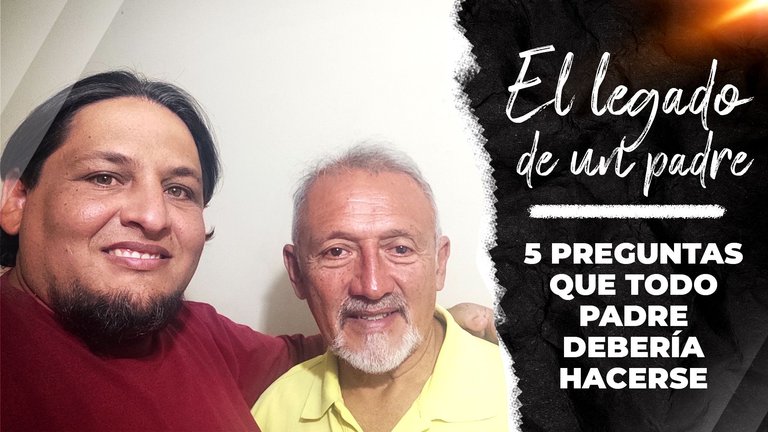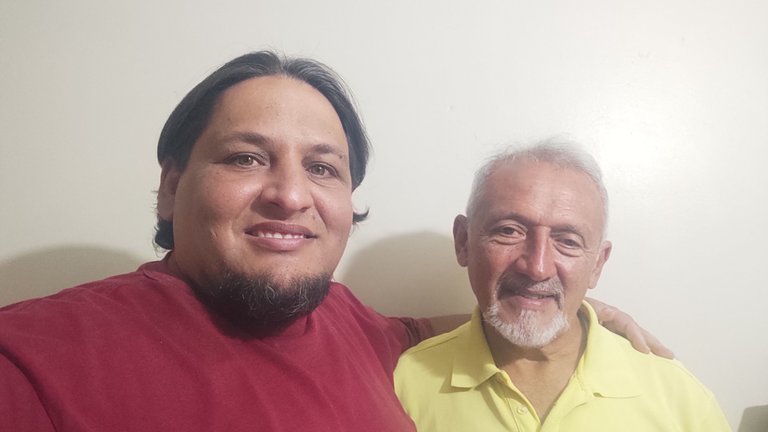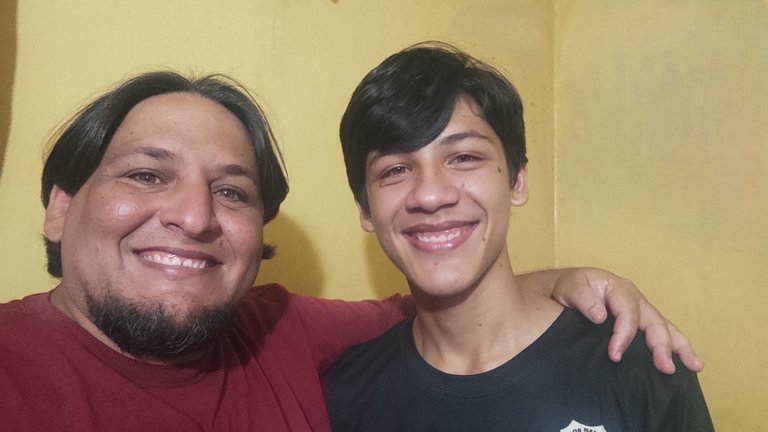My dad has always been a huge influence on my life, constantly reminding me that he strives to be the example that inspires us to be the best versions of ourselves. I remember wanting to be just like my dad when I was little. In fact, I have the same career as him because our house was filled with books and other related stuff. I also love the same music, sports, and countless other things. It's all because of his huge influence on my life.
El legado de un padre | 5 preguntas que todo padre debería hacerse
Mi papá siempre ha sido una gran influencia en mi vida, recordándome constantemente que él se esfuerza por ser el ejemplo que nos inspire a ser la mejor versión de nosotros mismos. Recuerdo querer ser como mi papá desde pequeño, de hecho, tengo la misma profesión que el porque la casa estaba llena de libros y muchas cosas relacionadas. También me encantan la misma música, los deportes y un sin número de cosas que soy, es por su gran influencia es mi vida.

Now, if you've read this far, you might think this is completely normal, especially if you've had a similar experience with one of your parents. But not everyone has the same experience. Some people end up hating their parents and strive to be a better role model themselves. For example, my grandfather never showed any affection towards my dad. When my dad would come home from working on the farm, he would take off my grandfather's work boots, and my grandfather would pat his head like he was a dog. My dad was determined to be better than that.
Puedes decir si me lees hasta aquí que es completamente normal, en especial si viviste algo similar con alguno de tus padres, pero no todas las personas viven lo mismo. Hay quienes terminan odiando quienes fueron sus padres y se esfuerza por ser un mejor modelo de padre, por ejemplo, mi abuelo jamás manifestó cariño a mí papá, cuando llegaba de la hacienda donde trabajaba, mi padre le quitaba las botas de trabajo y mi abuelo le sobaba la cabeza como si fuera un perrito, mi padre se propuso ser mejor que eso.

My dad showed me a lot of affection. No matter where I was, I would always greet him with a kiss on the cheek. Once, a classmate asked me if I was embarrassed to do that in the middle of the schoolyard in front of thousands of kids. I told him, "Not at all, why would I be?" In that moment, I realized that my reality, what I thought everyone did with their parents, wasn't the norm. I understood that my dad's approach was effective in making us feel completely comfortable with affection and a desire to improve ourselves.
Mi padre me manifestó mucho cariño, no importará dónde me encontrara con el, siempre le saludaba con un beso en la mejilla. Una vez un compañero de clase me preguntó al ver ese saludo en medio del patio del liceo frente a miles de jóvenes que si no me daba pena hacerlo, a lo que le respondí: para nada ¿porque tendría que darme pena? En ese momento comprendí que mi realidad, lo que creía que todos hacían con sus padres no era así, comprendí que el trato de mi papá fue efectivo para hacernos sentir en completa comodidad con el afecto y deseo de superación.

These experiences, and many others, taught me and prepared me to be a father without me even realizing it. Since becoming a father, I've thought about it a lot, questioning what I believe determines whether I'm doing as well as my dad or even better. I try to keep these thoughts in mind as much as possible to self-assess my parenting, knowing that my kids will go through different stages that require me to adjust how I treat them. To evaluate myself, based on what I learned from my relationship with my dad, I usually ask myself:
- When my kids are in trouble, do they isolate themselves from me to hide or do they come to me for support? It's obvious that if they come to me, they trust my judgment to help them solve their problem, not necessarily solve it for them, but rather guide them so they can find the solution themselves.
- Do my kids feel comfortable around me in public? Are they proud to be in my presence around other people? If you have a teenager who feels comfortable around you in public, then you're doing something really amazing, because they're programmed to be embarrassed by their parents.
- The hardest one for me is supporting them without judging them. In other words, am I able to help my kids do things that aren't necessarily my ideas of what they should be doing? We usually make the mistake of telling them how to do everything, taking away their opportunity to think and learn.
Estás experiencias y muchas otras, me enseñaron y me prepararon para ser padre sin darme cuenta. Desde que comenzó mi rol como padre he pensado varias veces en ello, cuestionándome con lo que creo puede determinar si lo estoy haciendo tan bien como mi papá o incluso mejor. Trato de mantener estas ideas presentes lo más que puedo, para autoevaluar mi gestión, sabiendo que mis hijos enfrentarán distintas etapas, que requieren hacer ajustes en mi forma de tratarlos. Para autoevaluarme, basado en lo aprendido en la relación con mi padre, suelo preguntarme:
- Mis hijos cuando están en problemas ¿se aíslan de mi para esconderse o se acercan a mi buscando apoyo? Es obvio que si recurren a mi, confian en mi criterio en ayudarles a solventar su problema, no necesariamente resolverlo yo, mas bien guiarles para que ellos mismos encuentren la solución.
- ¿Mis hijos se sienten cómodos conmigo en público? ¿Se sienten orgullosos de estar en mi presencia frente a otras personas? Si tienes un adolescente que se siente cómodo contigo en público, entonces estás haciendo algo realmente increíble, porque ellos están programados para avergonzarse de los padres.
- La más difícil de todas para mí es apoyarles sin juzgarlos, en otras palabras ¿Soy capaz de ayudar a mis hijos hacer cosas que no son necesariamente mis ideas de lo que deberían estar haciendo? Normalmente caemos en el error de decirles cómo deben hacer todo, quitándoles la oportunidad de pensar y aprender.
I believe these questions can encompass a father's self-assessment. I know that every parenting situation is different, but put this model to the test and ask yourself these questions. You'll be surprised how much it challenges your parenting.
Creo que es estas preguntas pueden englobar la autoevaluación de un padre, se que los casos de crianza son diversos, pero pon a prueba este modelo y hazte estas preguntas, seguro te sorprenderás lo mucho que pone en juicio tu gestión como padre.
Fotos tomadas con mi Redmi Note 9s
Edición con Photoshop
En primer lugar te felicito por el abordaje de un tema tan fascinante, el cual vivo de una manera bastante particular.
La autoevaluación siempre es importante, sobretodo por las diferencias entre las generaciones.
Definitivamente tu papá cambió el rumbo hacia el afecto paternal; y lo estás siguiendo bien al guíar a tus hijos con el testigo familiar en mano.
Saludos
Que bueno amigo que sean de ese grupo de padres que estamos constantemente evaluando nuestro desempeño para dar lo mejor a nuestros hijos, vaya para ti un fuerte abrazo, éxito!
@tipu curate
Upvoted 👌 (Mana: 34/54) Liquid rewards.
good parenting is not suitable for everyone for varied reasons
What are you talking about?